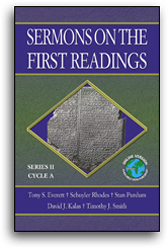SermonStudio
A Man Of The Moment
Sermon
Sermons On The First Readings
Series II, Cycle A
Do you remember the movie 1988 movie, Twins? It was comedy that starred Arnold Schwarzenegger and Danny DeVito as, of all things, twin brothers. Even if you know nothing about the plot of the movie, the mental picture of those two actors standing side-by-side as twins is itself pretty funny.


